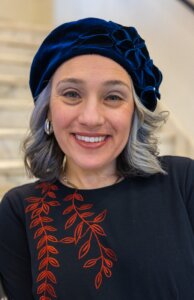With Trump as President Elect, Yiddish Literature Is More Important than Ever

Image by Laura E. Adkins
Donald Trump has won the presidency, but I am not quitting my day job.
Like many eight year-olds, I had mapped out a career plan so baroque that it would involve multiple stages. In my lithe youth, I would be a ballerina. After that, a stateswoman; maybe president. Finally, when I had acquired wisdom and some gray hairs, I would be a rabbi. As it turned out, I became a college professor.
I conduct the kind of research that thrives in elite scholarly realms but is easy to dismiss as a decadent luxury. I don’t build bridges or cure diseases—except in the metaphorical realm, which is where I actually do a lot of my best living. I study Jewish literature, mostly in Yiddish, a language that while not dead or even dying, is so suffused with loss that we might say it’s been attending its own funeral for over a century. Earlier this year, I published my first book, a reconsideration of the twentieth-century Yiddish novel in terms of genre.
Right now, I’m working on a large project about Yiddish children’s literature that involves first translating and annotating an anthology’s worth of stories, poems, and plays and then writing a critical study of their significance. The work of translation is extremely pleasurable. I like slipping into the voice of another writer, solving problems of linguistic register, figuring out how to bridge the gaps between the intended reader of the Yiddish original and of my new Anglo-American version of each piece. I woke up on Nov 9 reeling with the news of Trump’s victory, and suddenly the pleasure that I take in my work seemed solipsistic, selfish, obscenely disconnected from reality.
While I’ve been teaching and writing and earning tenure and attending faculty meetings, all this toxicity has been brewing. Was I fiddling on the roof as Rome burned? Blithely misspending my days and years?
I spent some mournful time on social media and realized how angry I am at the rise of this shape-shifting Rorschach blot of our most atavistic fears, how personally attacked I feel. Then I thought back to my first day of graduate school, on September 12, 2001. My first class was a lecture course on the Victorian Novel in its European Context with a soft-spoken but fearsomely intelligent literary scholar. I remember his opening remarks, delivered in the reedy voice to which I would become so carefully attuned in the years that followed. He said, essentially, that after the way the world had changed the day before, a course on the Victorian Novel might seem trivial, irrelevant. But in fact, everything that we aimed to accomplish in that lecture hall would stand to repudiate the hatefulness of the terrorists who had wrought such unimaginable destruction. Our best way to fight back was precisely to devote ourselves to robust humanistic inquiry and its attendant values of openness, curiosity, and other-directedness.
These thoughts came rushing back to me after our beloved country handed the reins to a newly minted politician whose entire campaign had traded on authoritarian demagoguery and a disregard for facts and decency alike that would be comical were it not so terrifying. The best way for me, trained as a humanist and a literary scholar, to stand tall against this onslaught is to practice my vocation with passion and precision. It is a gift to inhabit daily a world where words matter, and I am grateful to be in position to share that gift with others. But it can get pretty cozy and complacent and self-satisfied, to say that my best contribution is the one I’m already making. I think that in exchange for being granted a berth to do what I love so deeply, I owe an accounting of its political implications.
So let’s talk for a moment about the Yiddish children’s literature of a century ago as it pertains to 2016 America. The poignancy of the whole topic lies in the timing. Literature aimed at young readers of Yiddish arose during the first decades of the twentieth century, and it entered a phase of artistic glory just a moment before its international readership disappeared. It’s a familiar tale with Yiddish culture: what Hitler didn’t finish, Stalin nearly did. And what Stalin missed, linguistic assimilation took care of. Today I happened to be translating a story about Yom Kippur from a holiday compilation published in New York after the war. Set on the island of Trinidad, the story tells of a pious Catholic who, in his old age, turns aside from his faith after learning that he is descended from Spanish Jews fleeing the Inquisition. He haunts the island’s little shul, appearing at Kol Nidre prayers like a silent ghost.
Yiddish children’s literature, as we might expect, is preoccupied with questions of identity and how we choose it, of narrow escapes and fortuitous twists of fate, and of power and who gets to exercise it and how it might be wielded for the good. What political movements or sensibilities tend toward human flourishing? How do you counter cruelty? These were the questions that Jewish parents, educators and artists felt the need to lay before the children in their charge. Their answers, ideologically varied and raucous, tender and harsh, are under threat of extinction. There’s new urgency, then, to my work. I’m no longer translating these texts for their survival or my pleasure, or even for my pleasure in their survival. I’m translating and analyzing them because right now, our country needs desperately to know what they say.

















